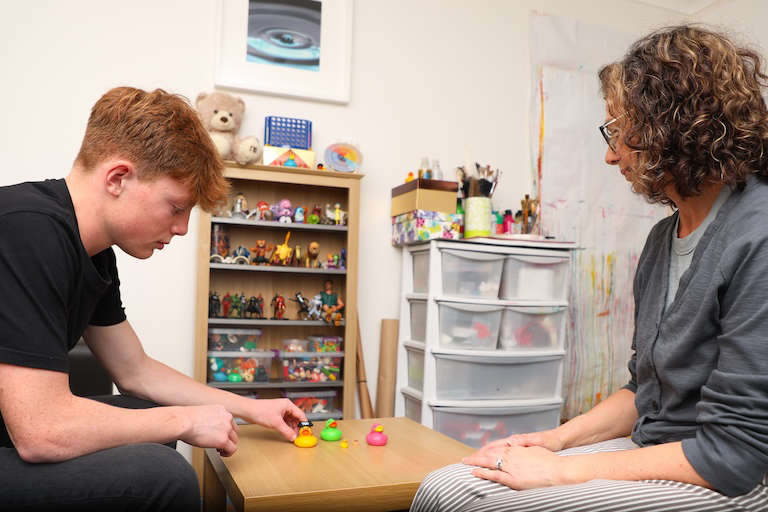(And Why That Question Might Be Hurting You)
Have you ever noticed that quiet question surfacing in your mind: “Am I too sensitive?”
It might come up after a conversation that left you feeling hurt, or when you’re wrestling with emotions you can’t quite explain. On the surface, it sounds like a way of keeping perspective. But often, this question carries a sharper edge. Instead of offering clarity, it can leave you doubting yourself, silencing your feelings, and wondering if you’re “too much.”
If you’ve ever found yourself googling am I too sensitive, you’re not alone — it’s one of the most common quiet fears people carry.
Each time you silence your feelings with the thought “Am I too sensitive?” you risk disconnecting from your needs and shrinking your world.

Sensitivity Isn’t a Flaw
The word oversensitive suggests an excess, as if you’re reacting more strongly than you should. But who decides what is too much?
Feelings don’t appear by accident. They arise to signal that something matters: a need, a boundary, a memory, or an old wound that’s still tender. Sensitivity is your body and mind working together to alert you. It is not weakness. It is information.
Many people type “am I too sensitive” into Google when what they really mean is: why do my feelings feel so big?
Sometimes what gets labelled as oversensitive is simply you responding in a very human way. So the next time you wonder am I too sensitive, remember that sensitivity is a signpost, not a defect.
What others call signs of being too sensitive may actually be signs of your strength, awareness, and care.
Why Sensitivity Can Feel Unsafe After Trauma
For those who have lived through trauma, anxiety, or overwhelming experiences, sensitivity often becomes heightened. The nervous system learns to scan for danger, to react quickly, and to protect at all costs.
In this context, emotions can feel too big or too quick. Tears, anger, or a racing heart may arrive before you’ve had a chance to think. When those around you dismiss your reactions with “You’re overreacting” or “You’re too sensitive,” the body’s protective responses begin to feel like something shameful.
But this is not a sign of failure. It is evidence of how hard your system has worked to keep you safe.
In therapy, we honour those protective parts rather than trying to silence them. Slowly and gently, we create the conditions where sensitivity can begin to feel less like a threat and more like a guide.
Stories from Therapy
One client once told me she felt embarrassed whenever she cried in front of others. She had grown used to hearing “You’re too sensitive” or “Stop overreacting.” Over time, she began saying it to herself before anyone else could.
In therapy, we slowed down and listened differently. Instead of pushing the tears away, we explored what they were holding. For her, tears carried stories of loneliness and the longing to feel understood. With time, she discovered that her sensitivity wasn’t something to hide. It was a bridge to connection, both with herself and with others.
When you stop doubting your feelings, you begin to hear the quiet wisdom that has been guiding you all along.
Another client noticed her sensitivity most in her relationship. Arguments with her partner often left her in floods of tears, followed by shame. She told me she wished she could “just toughen up.” Together we worked gently with those emotions, exploring what the tears were protecting. Over time, she came to see her strong feelings not as weakness but as signals.
They were moments when her body was telling her she needed reassurance or clarity. Learning to share that openly with her partner transformed their dynamic. Instead of shutting down, she found words to say, “This matters to me, and I need you to hear me.” What once felt like a liability became a doorway to greater honesty and intimacy.

A different client struggled at work. After meetings she would replay conversations, worrying she had taken things “too personally.” Each time she thought “Am I too sensitive?” she withdrew more from her colleagues. In therapy, she began to see her sensitivity as finely tuned awareness. Instead of questioning it, she learned to use it as information, noticing where boundaries were needed and when it was safe to open up. That shift not only eased her self-doubt but also improved her confidence at work.
Gentle Steps Towards Trusting Your Feelings
Learning to honour your emotions instead of questioning them is a gradual process. Small steps can begin to rebuild trust in yourself:
- Pause before self-judgement
When the thought “Am I too sensitive?” arises, notice it and gently replace it with “Something here matters to me.” - Name what you feel
Saying “I feel sad” or “I feel hurt” (even silently to yourself) can make emotions feel less overwhelming and more valid. - Ground in your body
Place a hand on your chest or notice your feet on the floor. Remind your nervous system that you are here and safe. - Share with someone safe
Expressing your feelings to someone who listens with care can counteract years of dismissal or minimisation. - Honour your pace
There is no rush. Sensitivity is part of your nervous system’s way of protecting you. Rebuilding trust takes time.
Each time you replace the thought am I too sensitive with a gentler question — “what is my feeling telling me?” — you begin to rewire self-doubt into self-trust.
Trusting your emotions is not about losing control, it’s about discovering the courage to live in alignment with your truth.
These steps are not rules to follow, but gentle invitations. Each small act of listening becomes a way of telling yourself: my feelings matter.
The Change That Becomes Possible
When sensitivity is welcomed rather than silenced, something begins to shift.
Your nervous system learns that emotions are not dangerous. They are signals you can listen to without fear. Anxiety softens enough for you to trust your instincts. Self-doubt loosens its grip as you begin to recognise your feelings as valid.
Relationships often feel lighter too. Instead of shutting down or exploding, you can share your needs more clearly. Sensitivity becomes a pathway to intimacy and connection rather than conflict and shame.
Over time, sensitivity no longer feels like something you must apologise for. It becomes a strength. A sign of your depth, your care, and your capacity to respond to the world around you.
A Gentle Reminder
If you have carried the label of being “too sensitive,” please know this: there is nothing broken in you. Sensitivity often develops in response to overwhelming experiences. It is your nervous system’s way of keeping you safe.
Living with the question am I too sensitive can be exhausting, but sensitivity is not something to cure — it is something to understand and embrace.
In therapy, we don’t push those parts of you aside. Instead, we welcome them with care. Together, we go at a pace that feels safe, exploring what your emotions are showing you, and slowly building trust in your inner signals again.
An Invitation
If you find yourself caught in the loop of asking “Am I too sensitive?” you don’t have to navigate this alone. Therapy can be a space to listen differently, to reclaim your sensitivity as something valuable, and to find steadiness in yourself again.
📩 If this resonates with you, I would be honoured to walk alongside you as you discover that your feelings are not too much. They are worthy of being heard.

